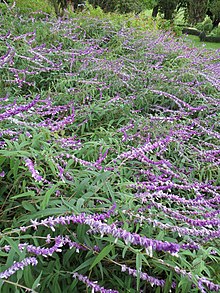Salvia leucantha, the Mexican bush sage, is a herbaceous perennial that is native to subtropical and tropical conifer forests in central and eastern Mexico. The flowers are usually white, emerging from coloured bracts. It is not frost hardy, but is often grown in warmer latitudes for its prominent arching velvety blue or purple inflorescences.[1]
| Salvia leucantha | |
|---|---|

| |
| Scientific classification | |
| Kingdom: | Plantae |
| Clade: | Tracheophytes |
| Clade: | Angiosperms |
| Clade: | Eudicots |
| Clade: | Asterids |
| Order: | Lamiales |
| Family: | Lamiaceae |
| Genus: | Salvia |
| Species: | S. leucantha
|
| Binomial name | |
| Salvia leucantha | |
It grows up to 1.3 m (4.3 ft) high and 2 m (6.6 ft) wide, with numerous erect stems, often arching at their tips, and with long inflorescences. The linear-lanceolate leaves are a soft mid-green, with whitish, hairy undersides.[1]
Cultivation
This plant has ornamental value in the garden, and has gained the Royal Horticultural Society's Award of Garden Merit.[2][3] It is a low-maintenance plant that grows best in full sun and moist but well-drained soils. Flowers attract butterflies, bees and hummingbirds. [4]
Etymology
The name Salvia was derived from Latin, meaning ‘healer’. This is the old name for sage with medicinal properties, and is a cognate with the word ‘salve’.[5]
Leucantha is derived from Greek, meaning ‘white-flowered’.[5]
Uses
A recent analysis of the essential oil of S. leucantha found it to be rich in the sesquiterpene hydrocarbons ; β-caryophyllene, α-guaiene, cis-muurola-3,5-diene, germacrene D, and bicyclogermacrene. Bornyl acetate constituted 23.9% of the oil.[6]
References
- ^ a b Clebsch, Betsy; Barner, Carol D. (2003). The New Book of Salvias. Timber Press. p. 171. ISBN 978-0-88192-560-9.
- ^ "RHS Plant Selector - Salvia leucantha". Retrieved 3 July 2013.
- ^ "AGM Plants - Ornamental" (PDF). Royal Horticultural Society. July 2017. p. 94. Retrieved 12 October 2018.
- ^ "Salvia leucantha - Plant Finder". www.missouribotanicalgarden.org. Retrieved 2018-07-03.
- ^ a b Gledhill, David (2008). "The Names of Plants". Cambridge University Press. ISBN 9780521866453 (hardback), ISBN 9780521685535 (paperback). pp 235, 339
- ^ Negi, Anuradha; Javed, Mohammad S; Melkani, Anand B; Dev, Vasu; Beauchamp, Philip S (Sep–Oct 2007). "Steam Volatile Terpenoids from Salvia leucantha". Journal of Essential Oil Research. 19 (5): 463–465. doi:10.1080/10412905.2007.9699953. ISSN 1041-2905.